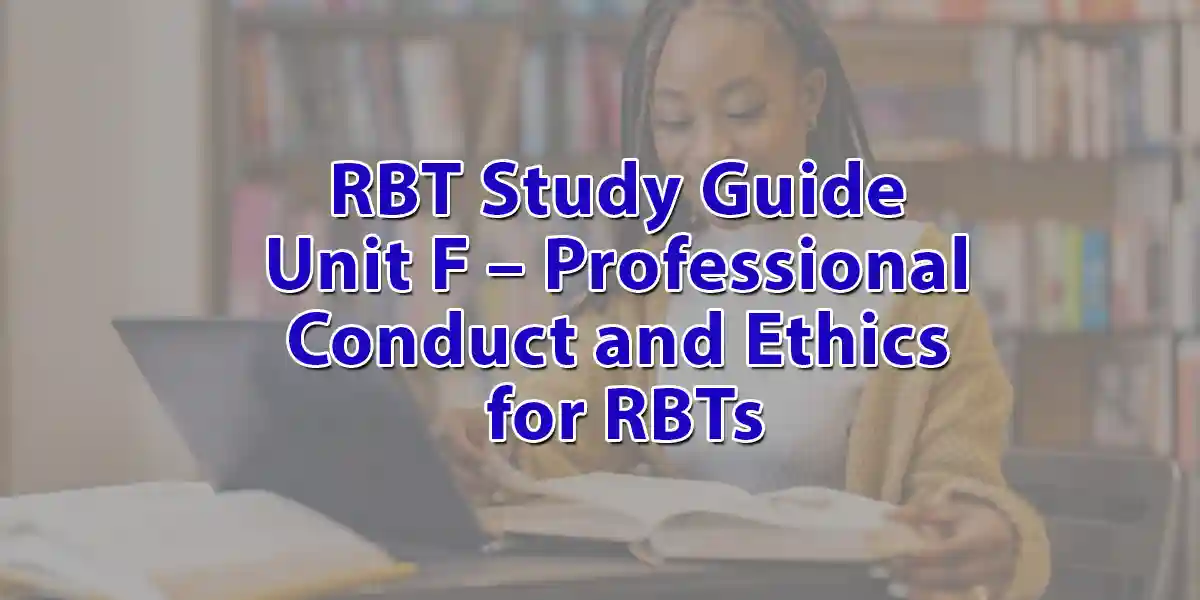Profession
The role of a Registered Behavior Technician (RBT) comes with both technical and ethical responsibilities. Unit F: Professional Conduct is the foundation of ethical behavior in the field of Applied Behavior Analysis (ABA). It emphasizes the standards that RBTs must uphold when interacting with clients, families, supervisors, and the public.
Whether you’re collecting behavior data, teaching new skills, or implementing a behavior reduction plan, your actions must be grounded in integrity, confidentiality, professionalism, and compassion. This unit ensures that your skills from Unit A: Measurement, Unit B: Assessment, Unit C: Skill Acquisition, Unit D: Behavior Reduction, and Unit E: Documentation are carried out in ways that meet the ethical guidelines defined by the Behavior Analyst Certification Board (BACB).
Let’s explore the core elements of Unit F and how you can prepare for ethical situations you’ll encounter during your RBT exam and on the job. You’ll also see how RBT Practice Exams 1, 2, 3, 4, and 5 reinforce these essential principles.
Understanding the BACB RBT Ethics Code
The BACB Ethics Code for RBTs outlines the expectations and professional boundaries that all technicians must follow. These rules protect clients’ rights, maintain trust in ABA services, and ensure ethical treatment delivery.
There are six main sections within the ethics code:
- Responsibility to Clients
- Responsibility to Supervisors
- Competence and Service Delivery
- Integrity and Transparency
- Professionalism
- Confidentiality and Record-Keeping
Each section contains rules that guide how you behave in everyday practice—from how you speak to clients to how you report incidents to your supervisor.
Understanding this code is essential not only for passing your RBT exam but for ensuring you maintain the dignity and safety of those you serve.
Maintaining Client Dignity and Rights
At the heart of ethical ABA practice is a commitment to client dignity. RBTs are expected to treat clients with respect at all times, regardless of their behavior, diagnosis, or communication abilities.
Key responsibilities include:
- Using person-first or preferred language
- Avoiding demeaning terms, even in casual conversation
- Maintaining confidentiality at all times
- Respecting the client’s right to refuse participation
- Seeking assent and reinforcing autonomy when appropriate
For example, if a client refuses to participate in an activity, it’s your job to respect their preference while still following the behavior plan. Ethical conduct means finding ways to build cooperation without coercion.
Client dignity is often tested indirectly in RBT Practice Exam 1, where you’ll encounter situations that challenge your respect for autonomy and neutrality.
Following the Scope of Practice and Scope of Competence
As an RBT, you have a clearly defined scope of practice—tasks you are trained and authorized to perform under the supervision of a BCBA. Acting outside of this scope can lead to ethical violations, ineffective services, and harm to the client.
You may NOT:
- Conduct assessments independently
- Design or change teaching plans
- Interpret data or diagnose conditions
- Supervise other RBTs unless qualified and authorized
Scope of competence refers to your responsibility to only perform tasks you’ve been trained in and are proficient in. For example, if you’re assigned to implement a feeding protocol but haven’t been trained in that area, you have to speak up.
This ties directly into what you’ve learned in Unit B: Assessment and Unit C: Skill Acquisition, as you’re often asked to assist but not lead those processes.
RBT Practice Exam 2 features scope-related questions that help you understand where your responsibilities begin—and where they end.
Professional Behavior and Boundaries
Professional conduct goes beyond following instructions—it includes your tone, punctuality, dress code, use of language, and boundaries with clients and families.
Key rules include:
- Avoiding dual relationships (e.g., becoming friends or socializing with clients outside work)
- Not accepting or giving gifts
- Not sharing personal contact info
- Not engaging in social media interaction with clients
- Always arriving on time and prepared
- Wearing professional attire and presenting yourself respectfully
Failing to follow these rules can damage trust, skew treatment outcomes, and result in dismissal or certification loss.
Professionalism connects with every task you perform—from writing objective Unit E: Documentation to accurately recording behavior for Unit A: Measurement.
RBT Practice Exam 3 presents several professionalism-based questions that test your ability to handle social and workplace boundaries appropriately.
Communicating Effectively with Supervisors
Supervision is a major component of your role. As an RBT, you are required to receive ongoing supervision from a BCBA or BCaBA. Open communication, honesty, and responsiveness to feedback are all signs of ethical conduct.
Your obligations include:
- Attending supervision meetings as scheduled
- Asking questions when you’re unsure
- Reporting incidents or deviations from the plan
- Implementing feedback without resistance
- Notifying your supervisor of challenges in the session
This principle supports everything from Unit D: Behavior Reduction (e.g., implementing BIPs correctly) to Unit F itself, where transparency and honesty are emphasized.
RBT Practice Exam 4 includes scenarios where you’re asked to choose how to communicate an issue to your supervisor, like when a client engages in new behaviors or a caregiver asks for advice beyond your scope.
Data Integrity and Ethical Reporting
Honest and accurate documentation is a professional and legal obligation. You must never:
- Falsify data
- Copy-paste session notes
- Modify records after the fact
- Complete documentation for another RBT
- Skip data collection without explanation
If a client misses a session, the note must reflect that. If a trial was not completed, document it. Errors in data compromise treatment decisions and violate ethical standards.
Unit A: Measurement teaches how to collect behavior data accurately. Unit E: Documentation shows you how to write up what happened. Unit F demands that you report honestly and professionally every time.
RBT Practice Exam 5 contains multiple questions that require you to identify ethical versus unethical documentation and reporting practices.
Respecting Confidentiality and HIPAA Compliance
All client information must be protected under HIPAA (Health Insurance Portability and Accountability Act). You are legally required to:
- Avoid discussing clients in public places
- Keep data secure and password protected
- Use initials or ID numbers instead of names in non-secure settings
- Refrain from discussing cases with unauthorized individuals
- Follow your organization’s confidentiality protocols
Even small breaches—like discussing a client in a hallway—can have big consequences.
When reviewing behavior with colleagues or supervisors, do so privately. Use encrypted platforms when communicating electronically, and never save client data on personal devices.
Confidentiality rules support ethical documentation, informed consent, and overall professional conduct.
These issues often appear in RBT Practice Exam 1 and Exam 5, where you’ll evaluate whether certain situations comply with privacy standards.
Responding to Emergencies and Reporting Concerns
If you witness unsafe conditions, abuse, or unethical conduct, you are mandated to report it. As an RBT, your responsibility is to:
- Ensure client safety first
- Notify your supervisor immediately
- Follow the organization’s incident reporting procedure
- File reports with external agencies if directed or required
- Document the event accurately and objectively
For example, if a fellow RBT uses a punishment procedure not in the behavior plan, you must report it. If a client arrives with unexplained bruising, notify your supervisor per protocol.
Your obligation is to the client’s well-being—even if it means reporting a colleague.
These situations reflect real ethical tests and are practiced extensively in RBT Practice Exam 4, where scenarios test your readiness to protect clients and act with courage and compliance.
Understanding Informed Consent and Assent
Before implementing any procedure, clients (or their guardians) must give informed consent—a legal and ethical agreement to participate in treatment. They must be:
- Informed of risks and benefits
- Aware of their right to refuse
- Given information in a language and format they understand
Additionally, assent refers to a client’s agreement to participate—even if they’re not their own guardian. RBTs should respect a child’s refusal, even if the parent has consented.
This concept is integrated into treatment decisions in Unit C: Skill Acquisition, where we teach based on client readiness and willingness.
RBT Practice Exam 2 may ask you how to respond when a client appears distressed despite parent approval. These questions help you reinforce the client-centered values that underpin ethical practice.
Cultural Sensitivity and Non-Discrimination
You must provide services without bias or discrimination based on:
- Race, ethnicity, or nationality
- Religion or belief
- Gender identity or expression
- Sexual orientation
- Age or disability
- Language or socio-economic status
Cultural sensitivity includes understanding family customs, modifying reinforcers to reflect client values, and ensuring your interventions don’t impose personal beliefs.
Always ask your supervisor when unsure how to navigate cultural concerns. Clients deserve respect and equity in care.
While technical ABA practices like Unit B: Assessment may seem objective, their delivery must always be filtered through cultural understanding—something emphasized repeatedly in Unit F.
Conclusion: Ethics That Guide Every Interaction
Unit F: Professional Conduct is more than rules—it’s a philosophy of respectful, ethical, and effective service delivery. By following this code, you protect your clients, your team, and yourself.
Professional conduct affects every part of your work:
- In Unit A: Measurement, when you record data honestly
- In Unit B: Assessment, when you collect observations ethically
- In Unit C: Skill Acquisition, when you follow plans with integrity
- In Unit D: Behavior Reduction, when you implement humane interventions
- In Unit E: Documentation, when you write clearly and truthfully
- In Unit F itself, when you act with respect and professionalism
To prepare fully, engage with RBT Practice Exams 1 through 5. These tests simulate ethical dilemmas and reinforce how professionalism is applied in real-world ABA.
Ultimately, being an RBT isn’t just about knowing what to do—it’s about doing it the right way, every time.

